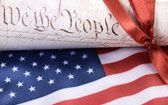Profiles Of Poker Lawmakers
 Poker, whether online or on the ground, seems to be increasingly politicized these days. There has been so much talk about actually having various states begin to implement legislation that would allow some element of freedom in terms of legalizing (or at the very least taking much of the criminal aspects out of simply playing a game) this uniquely American game. There are a number of states which seem to be moving on the issue in one direction or another. Here are some profiles of the lawmakers within those states that may be worth watching in terms of their support or opposition for poker legislation.
Poker, whether online or on the ground, seems to be increasingly politicized these days. There has been so much talk about actually having various states begin to implement legislation that would allow some element of freedom in terms of legalizing (or at the very least taking much of the criminal aspects out of simply playing a game) this uniquely American game. There are a number of states which seem to be moving on the issue in one direction or another. Here are some profiles of the lawmakers within those states that may be worth watching in terms of their support or opposition for poker legislation.
Delaware: Anthony DeLuca
Mr. DeLuca is the President Pro Tem of the Delaware State Senate. He was the lead and primary sponsor of the Delaware Gaming Competitiveness Act of 2012. This bill did indeed pass in a close vote and was then signed by the Governor, Democrat Jack Markell. This made Delware the first state to enter the world of legal casino gambling, allowing online poker to state residents.
Anthony "Tony" DeLuca was a Democrat who served in the Delaware Senate from 1999 to 2012, representing the 11th District. During his tenure, he chaired the State Senate Executive Committee, Ethics Committee, Legislative Council, and the Permanent Rules Committee. He was also a member of the Judiciary and Labor and Industrial Relations Committees. He lost a September 11, 2012 Democratic primary to Bryan Townsend, shortly after the passage of the above referenced law.
Nevada: William Horne
Assemblyman William Horne was the Democratic Majority Floor Leader since 2011. He has served in the Nevada assembly since 2002, through eight special and six regular sessions. His District 34 represents Clark County which is where Las Vegas is located. Mr. Horne is on a number of caucuses including the Caucus of African Americans Nevada, National lack Caucus of State Legislators and Hispanics in Politics.
In terms of poker related initiatives, William Horne was very instrumental in pushing a bill through the state assembly that allowed Nevada to approve interstate online gambling including online poker. Republican Governor Brian Sandoval was very eager to sign this bill as it was presented to him February 21, 2013.
New Jersey: Raymond Lesniak
Raymond Lesniak is a State Senator in New Jersey. The Democrat for the 20th legislative district has been in his position since 1983. Before this, he served in the New Jersey General Assembly from 1978 to 1983.
The good Senator has been a key proponent and chief sponsor of several bills in recent years to attempt bring the legalization of online poker to his state. Back in 2011, his initial attempt was vetoed by the governor. Going back to the drawing board, Senator Lesniak brought a modified bill to the governor again in 2013, which was signed into law. Thanks to this legislation, New Jersey is currently one of the few states in the US to allow online poker to people residing within New Jersey.
New York: J. Gary Pretlow
James Gary Pretlow is a Democratic member of the New York State Assembly for the 89th district (the district includes Mount Vernon and Yonkers). He has been serving in this capacity since 1992. Prior to his election to the state level, he served on the Mount Vernon, NY city council. He is a member of the Assembly Committees on Rules, Ways and Means, Codes, Insurance, Cities, and the Assembly Steering Commission.
The Senator has also served on the Racing and Wagering Committee since 2005, so perhaps it is no surprise that he would be bring forth a new online poker bill. His bill would amend the current racing laws by adding online poker to the list of legal gaming options, with Texas Holdem and Omaha being mentioned specifically. These laws due bear watching since not many observers have previously consider New York a state where legalized poker was very likely.
California: Reginald Byron Jones-Sawyer
Jones Sawyer is a California State Assembly member. He is a Democrat who has been serving in this current position since 2012. His 59th district represents parts of South Los Angeles. Prior to his election to the state assembly, he was the Director of Asset Management for Los Angeles and the Secretary of the California Democratic Party.
Jones-Sawyer is one of the strongest supporter in the California Assembly in regards to the legalization of poker. He was one of the sponsors of AB 2291 that would have legalized online poker throughout the state. Sadly, this bill was shelved due to political reasons including the inability of the lawmakers to work out the language of the bill. The hope of the good Assemblyman is that lawmakers will take the issue back up again in December.
Pennsylvania: Mario Scavello
State Representative Mario Scavello is a Republican who hails from the 176th legislative district. His tenure in this chamber began in 2002 and he currently sits on the House Appropriations, Ethics, Finance, Professional Licensure, and Tourism and Recreational Development Committees. Prior to election to the House, he was the Mayor of Mount Pocono and former chairman of the Monroe County Board of Commissioners.
Sadly, Representative Scavello is no friend of poker or gambling. He has actually argued in favor of fining and jailing those who illegally play online poker in his state. Although he has not sponsored any bills to add these penalties, he will certainly not be a vote in favor of any possible poker legalization bill in the future. The legislature did study the idea of legal poker as the result of Senate Resolution 273, but this seems to be going nowhere fast right now.
Mississippi: Bobby Moak
Representing the 53rd district in the Mississippi state house, Bobby Moak is a Democrat who has been serving since 1983. He won his first seat in the State House basically right after finishing college and then law school.
Mr. Moak is indeed a good friend of internet poker, and gambling in general. He has sponsored bills that would legalize online poker across the board in Mississippi for each of the last three years. Sadly, none of these bills have yet been able to make it out of committees. Even still, the Mississippi House Gaming Commission has requested a study looking into the merits of online poker. Perhaps in the future there will be some movement to really make things happen.
It is clear that the country is starting to demand action in favor of making it easier to play poker. This is especially true when it comes to online poker. US citizens are tired of having a big brother government who thinks they know better than we do. No government should be able to legislate morality, certainly not over something as simple as playing a game either over the internet or at the neighborhood club or church. We should continue watching the above state legislators as the fight continues to lessen the restrictions on poker across the country.
 Poker, whether online or on the ground, seems to be increasingly politicized these days. There has been so much talk about actually having various states begin to implement legislation that would allow some element of freedom in terms of legalizing (or at the very least taking much of the criminal aspects out of simply playing a game) this uniquely American game. There are a number of states which seem to be moving on the issue in one direction or another. Here are some profiles of the lawmakers within those states that may be worth watching in terms of their support or opposition for poker legislation.
Poker, whether online or on the ground, seems to be increasingly politicized these days. There has been so much talk about actually having various states begin to implement legislation that would allow some element of freedom in terms of legalizing (or at the very least taking much of the criminal aspects out of simply playing a game) this uniquely American game. There are a number of states which seem to be moving on the issue in one direction or another. Here are some profiles of the lawmakers within those states that may be worth watching in terms of their support or opposition for poker legislation.



